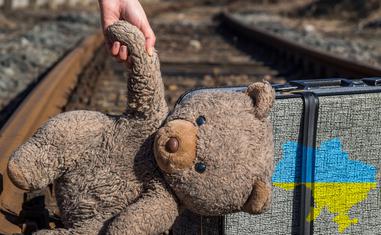The ongoing conflict in Ukraine has garnered global attention, uniting the hearts and minds of countless individuals across diverse backgrounds. As Bahá’í followers, the principles of compassion and service to humanity compel adherents to respond with both prayer and action in times of crisis. The question emerges: how can we, as a community inspired by Bahá’í teachings, meaningfully support the people of Ukraine while also deepening our spiritual and practical engagement? This inquiry not only opens a dialogue about our responsibilities but challenges us to transcend our immediate environments in favor of a broader, compassionate outreach.
Central to Bahá’í teachings is the concept of unity. Unity entails acknowledging the interconnectedness of all people, regardless of their nationality, religion, or social standing. The plight of the Ukrainian people serves as a poignant reminder that suffering does not recognize borders. In recognizing this shared humanity, we are called to pray fervently for those enduring the hardships of war, violence, and displacement. Prayer, in the Bahá’í context, is a profound act that transcends mere words; it is a means of harnessing spiritual energy to effect change not solely in our individual lives but within the collective human experience.
Effective engagement begins with prayer. It can serve as the foundation for any action taken to assist those in need. Bahá’ís believe that prayer cultivates a sense of empathy and understanding, allowing one to perceive the challenges faced by others. Regularly dedicating time to pray for the well-being of the people of Ukraine and for peace to prevail is essential. Beyond personal reflection, communal prayer—gathering in groups to invoke spiritual assistance—reinforces unity and encourages a collaborative spirit among Bahá’í followers.
However, prayer must not exist in isolation. It is paramount that it be accompanied by action. The Bahá’í teachings encourage both spiritual and practical responses. Indeed, one may wonder: what forms of action are most effective in supporting the Ukrainian population during this critical time? The answer lies in multiple pathways that intertwine service and advocacy.
One significant avenue involves humanitarian assistance, which can be channeled through donations or volunteering with organizations dedicated to providing relief to those affected by the conflict. Donating to reputable charitable organizations that deliver food, medical care, and shelter for refugees is a tangible way to make a difference. Such actions resonate with the Bahá’í principle of collective responsibility—acknowledging that we share in the fate of our brothers and sisters worldwide.
Moreover, activism plays an indispensable role in our response. Advocacy for peace and justice on international forums, as well as local discussions, creates a powerful voice for change. Engaging with governmental entities and non-governmental organizations to urge interventions based on humane principles is vital. Through letter-writing campaigns or attending peaceful protests, we can amplify the call for peace, demonstrating that the Bahá’í community is not only a contemplative group but a proactive force in society.
Additionally, the power of education cannot be overlooked. Hosting events, workshops, or discussions about the situation in Ukraine within the Bahá’í community can raise awareness and foster understanding among individuals who may not grasp the full scope of the crisis. Sharing information, personal stories, and perspectives from Ukrainian individuals can humanize the statistics often referenced in media reports. Education encourages an informed community, impelling individuals to act decisively when the opportunity arises.
As we reflect on our roles, we should also consider the importance of personal connections. Engaging with Ukrainian communities, whether locally or globally, opens doors for one-on-one interactions that can profoundly affect both sides. Building relationships with those affected fosters empathy, leading to more genuine assistance tailored to their actual needs. This dimension of interpersonal action aligns seamlessly with the Bahá’í commitment to unity and the elimination of prejudice.
Furthermore, another layer of involvement can manifest through artistic and cultural expressions. Organizing benefits, art exhibitions, and performances celebrating Ukrainian culture can engender solidarity while also raising funds for humanitarian efforts. The creativity inherent in art can serve as a bridge, connecting disparate communities through shared artistic experiences, thereby reinforcing the bonds of humanity.
Nevertheless, in our fervor to support the people of Ukraine, we must be mindful not to cultivate a sense of overwhelming despair. It is easy to get caught in feelings of helplessness amidst such significant suffering. Yet, Bahá’í teachings advocate for a balanced approach—recognizing the seriousness of a crisis while also holding on to hope and resilience. By fostering this dual perspective, we are empowered to persist in our efforts even when faced with seemingly insurmountable challenges.
In conclusion, as Bahá’ís, the imperative to pray for and act on behalf of the people of Ukraine is a profound expression of our commitment to humanity. Through the combination of sincere prayer and concerted action, we can engage in a holistic response that reflects the core tenets of our faith. As we pose questions and embrace challenges, let us remember that each act—no matter how small—contributes to the tapestry of love, support, and unity stretched over the global community. Together, we can illuminate the path toward peace, justice, and healing, standing steadfast in our commitment to the well-being of all.
